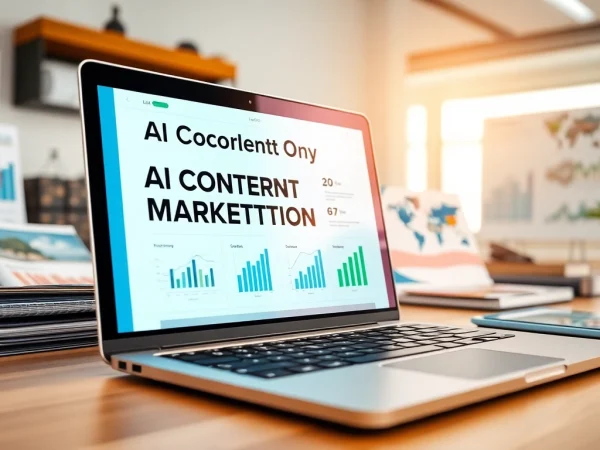Boost Your Business Efficiency with the Best AI Marketing Tools
Understanding AI Marketing Tools
What Are AI Marketing Tools?
AI marketing tools refer to a collection of software solutions and technologies that leverage artificial intelligence to enhance marketing efforts. These tools automate various marketing tasks, analyze consumer behavior, and provide insights that are pivotal in shaping marketing strategies. In essence, they help businesses engage more effectively with their target audiences by utilizing data-driven approaches and advanced algorithms. By integrating AI marketing tools into their operations, companies can streamline processes, improve decision-making, and ultimately drive better results.
Benefits of AI in Marketing
The benefits of incorporating AI technology in marketing are manifold. Firstly, AI can analyze vast datasets at unprecedented speeds, uncovering insights that would be impossible for human analysts to identify efficiently. This data analysis allows marketers to understand customer preferences and behaviors, enabling personalized experiences that resonate with their target audience. Additionally, AI-driven tools can automate repetitive tasks such as email campaigns, social media posting, and customer segmentation, freeing up marketing professionals to work on strategic initiatives.
Another significant advantage is the enhanced targeting that AI offers. With predictive analytics, AI tools can forecast customer behavior, helping marketers to optimize their ad spend by targeting the right audience segments at the right moments. Furthermore, AI assists in A/B testing and campaign optimization by providing real-time feedback on performance, thus facilitating continuous improvement.
How AI Tools Enhance Customer Targeting
AI marketing tools significantly enhance customer targeting through advanced data analysis and segmentation capabilities. By employing machine learning algorithms, these tools can identify patterns and correlations within consumer data that traditional methods might miss. For instance, they can analyze demographics, browsing behaviors, and purchase histories to create detailed customer profiles. This segmentation allows for more precise targeting, enabling marketers to deliver personalized content and offers tailored to individual preferences.
Additionally, AI tools can adapt in real-time to changes in customer behavior, adjusting marketing campaigns as needed to ensure optimal engagement. This adaptability is crucial in today’s fast-paced digital landscape, where consumer expectations are continuously evolving. Ultimately, the precision of AI-enhanced targeting not only improves campaign effectiveness but also increases overall return on investment (ROI).
Top AI Marketing Tools to Consider
Essential Features to Look For
When evaluating AI marketing tools, certain essential features can make a significant difference in their effectiveness. These include:
- Data Analytics: The ability to gather, analyze, and interpret large volumes of data is crucial. Look for tools that provide comprehensive dashboards and actionable insights.
- Automation Capabilities: Tools that automate repetitive tasks such as email campaigns, social media management, and customer segmentation can drastically improve efficiency.
- Integration Flexibility: A good AI marketing tool should seamlessly integrate with existing systems, including CRM platforms and content management systems, to enhance overall functionality.
- User-Friendly Interface: The tool should offer a straightforward and intuitive interface that allows marketing teams to utilize its features without extensive training.
- Customer Support: Reliable customer support is crucial, especially when implementing new technologies. Ensure that the provider offers robust support options, including tutorials and responsive service.
Comparison of Leading AI Tools
With numerous AI marketing tools available, comparing their features can help in selecting the right fit for your business needs. Here’s a quick overview of some leading options:
| Tool | Key Features | Best For |
|---|---|---|
| HubSpot | Comprehensive CRM, email marketing automation, analytics | All-in-one marketing solution |
| Jasper | AI-driven content creation, SEO optimization | Content marketers seeking efficiency |
| SEMrush | SEO, PPC, and competitor analysis | Digital marketing agencies |
| Canva | Design automation, templates, and visuals | Visual content creation |
| Salesforce Marketing Cloud | Personalized customer journeys, automation | Enterprise-level marketing campaigns |
User Recommendations and Reviews
User feedback is invaluable when assessing the effectiveness of AI marketing tools. Here are some insights:
- HubSpot: Users rave about its comprehensive suite of tools and ease of use, making it suitable for businesses of all sizes.
- Jasper: Praised for its high-quality content generation, Jasper is popular among marketers focused on content-driven strategies.
- SEMrush: It is highly regarded for its robust analytics capabilities, making it a staple for SEO professionals.
- Canva: Many users appreciate the simplicity and variety of templates, making it easy to create stunning marketing materials in no time.
- Salesforce Marketing Cloud: Though complex, its powerful features are acknowledged as essential for large corporations managing extensive campaigns.
Integrating AI Tools into Your Marketing Strategy
Step-by-Step Implementation Guide
Integrating AI tools into your existing marketing strategy can seem daunting, but following a structured approach can make the process smoother:
- Assess Your Needs: Evaluate your current marketing processes to identify areas where AI can add value.
- Research Tools: Based on your needs, research various AI marketing tools to find the ones that best align with your objectives.
- Set Clear Goals: Define specific, measurable goals for what you want to achieve with AI integration, whether it’s enhancing customer engagement or increasing sales.
- Train Your Team: Invest in training for your marketing team to ensure they understand how to utilize the new tools effectively.
- Start Small: Consider piloting the tools with a small campaign to test effectiveness before a full rollout.
- Evaluate & Optimize: Monitor results closely and adjust your strategy based on performance metrics and feedback.
Common Challenges and Solutions
Implementing AI tools may present various challenges. Here are some common issues and solutions:
- Resistance to Change: Teams may be hesitant to adopt new technology. Foster a culture of innovation and provide training to ease the transition.
- Data Privacy Concerns: Ensure compliance with data protection regulations by being transparent about data usage and securing customer information.
- Integration Issues: Compatibility problems with existing systems can arise. Choose tools known for their integration capabilities or consult IT professionals during implementation.
- Budget Constraints: AI tools can be costly. Focus on selecting solutions that provide the best ROI and consider phased implementation to spread costs over time.
Measuring Success After Implementation
Once AI tools are integrated into your marketing strategy, measuring their impact is crucial for evaluating success. Key performance indicators (KPIs) to consider include:
- Conversion Rates: Compare conversion rates before and after AI implementation to evaluate its effectiveness.
- Engagement Metrics: Assess changes in customer engagement, such as click-through rates and social media interactions.
- Customer Satisfaction: Gather feedback through surveys or Net Promoter Scores (NPS) to gauge customer sentiments.
- Return on Investment (ROI): Calculate the ROI from campaigns where AI tools were utilized to determine financial impact.
Future Trends in AI Marketing
Predictions for AI Tool Evolution
The future of AI in marketing indicates continuous evolution driven by technological advancements. Some predictions for the next five years include:
- Increased Personalization: AI tools will become even more adept at personalizing marketing messages, utilizing enhanced data analytics to tailor content uniquely for each user.
- Advanced Automation: The capabilities of AI in automating complex marketing tasks will expand, leading to further efficiency and productivity improvements.
- Voice and Visual Search Optimization: As consumers increasingly lean towards voice and visual searches, AI tools will adapt to accommodate these trends effectively.
- Improved Predictive Analytics: Future advancements will result in even stronger predictive capabilities, further optimizing marketing strategies based on consumer behaviors.
Emerging Technologies in Marketing
New technologies are continually surfacing in the marketing landscape, driven by AI innovations. Notable emerging technologies include:
- Chatbots and Virtual Assistants: The rise of conversational AI will see more brands adopting chatbots for customer service, enhancing user interaction and satisfaction.
- Augmented Reality (AR): AI-infused AR can provide immersive consumer experiences, allowing customers to engage with products in innovative ways.
- Blockchain Technology: For data transparency and security, blockchain can revolutionize customer data management while ensuring privacy and compliance.
- IoT Integration: The Internet of Things will connect devices and provide marketers with unprecedented data to power AI-driven campaigns.
Building a Resilient Marketing Strategy
As the landscape of AI marketing evolves, building a resilient strategy is essential. Key components of a resilient marketing strategy include:
- Adaptability: Ensure your strategies can be quickly adjusted based on market shifts and emerging technologies.
- Continuous Learning: Stay informed of AI advancements and trends to keep your marketing approach fresh and effective.
- Customer-Centric Focus: Emphasize the customer experience, leveraging AI to enrich user engagement and satisfaction.
- Testing and Iteration: Regularly test new strategies and tools, using data to inform decisions and drive improvements.
Conclusion and Final Thoughts
Summarizing Key Takeaways
AI marketing tools offer immense potential for businesses looking to enhance their marketing efforts through automation, data-driven insights, and improved targeting. Companies can unlock significant benefits by understanding what these tools can do and implementing them thoughtfully.
Encouragement for AI Adoption
As competition increases and consumer behavior evolves, the adoption of AI marketing tools is no longer optional; it’s essential. Embracing this technology can empower businesses to operate more efficiently, connect with customers more effectively, and keep pace with industry advancements.
Further Reading and Resources
For those looking to dive deeper into AI marketing, consider exploring the following resources:
- 24 AI marketing tools your team should be using in 2025
- What Are the Best AI Marketing Tools?
- The 8 best AI tools for social media management in 2025










